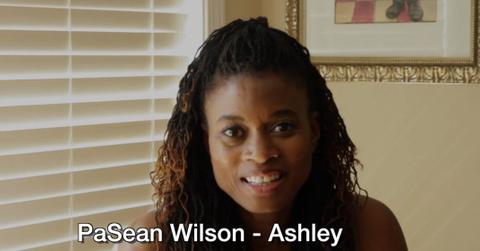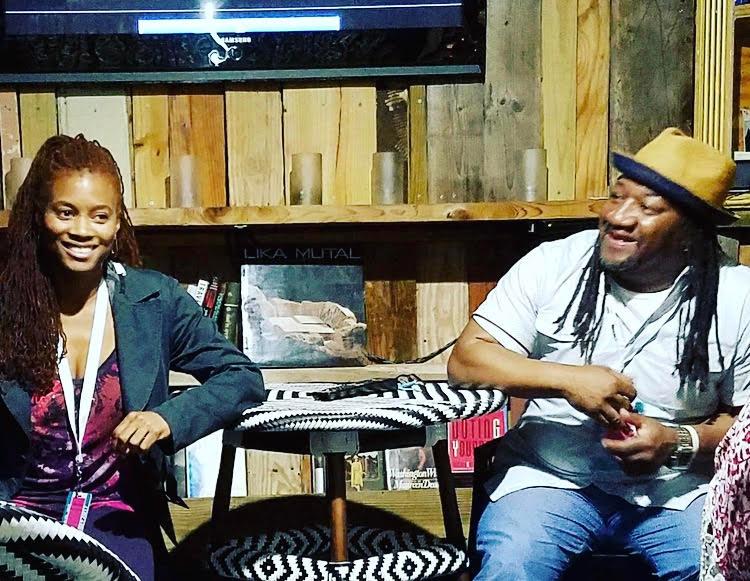
Photo Via: The F Word
PaSean Wilson-Ashley is Sounding the Alarm on Fibroids
By Elysia JDec. 18 2020, Updated 5:39 p.m. ET
When PaSean Wilson-Ashley’s doctor told her that she needed a hysterotomy to treat her fibroids she knew one thing for sure: “I was not going to submit to a hysterectomy.”
Fibroids are a non-cancerous, smooth muscle tumor that forms in the uterus. They can vary massively in number and size between patients. Those with large fibroids or a lot of them experience symptoms such as heavy menstrual bleeding, longer periods, intense cramping, difficulty emptying the bladder, and anemia. It is estimated that 20 to 40 percent of women over the age of 35 have fibroids. While they occur in all women, they both disproportionately affect, and are more likely to be severe in Black women.
She had been diagnosed with the condition years prior. The doctor’s prognosis was much different the first time around. “The doctor told me that they were small, we didn’t really have to do anything, we could use the watch and wait for approach. I was very excited as I was raised by a woman who was very into all types of holistic healing, so I thought this doctor was so enlightened that she was encouraging me to watch and wait and not suggesting surgery.”
Now all of a sudden she was being told she could die by her next period because her hemoglobin was so low. Most people upon hearing that would probably take it to heart but PaSean was determined. “I said, ‘what are you talking about I’m going hiking as soon as I leave here,'” and started looking for another way forward. She tried a number of holistic treatments, some of which helped to minimize her symptoms but nothing got rid of the fibroids. That was until someone told her about a doctor who could perform a myomectomy. This procedure surgically removes the tumors without the need to remove the womb. It was only after she had undergone the procedure that she realized she needed to spread the word.
“I started the journey of the documentary because when I woke up from the myomectomy my dad and my sister were in the recovery room, and they said to me, you’re not going to believe this. While we were in the waiting room the doctor came out to a woman sitting next to us and said ‘I’m so sorry I know your sister is only 25 years old but I had to give her a hysterectomy.’ When I heard that I literally started crying. I said I have to do a documentary. I needed to let women know that there are treatment alternatives to hysterectomies.”
The F-Word: Fibroid Stories aims to raise awareness, both of the condition itself, and the treatment options available.
(Video contains brief scenes of surgery)
In the documentary, PaSean interviews women about their experiences with fibroids, and their treatment by doctors. She also interviews two Doctors (Dr. Stanley West and Dr. Allan Warshowski) who argue that far too many hysterectomies are done unnecessarily.
This is certainly evident in PeSean’s story. She found a way to treat her fibroids without a hysterectomy despite being explicitly told that was her only option. Why did neither of the first two doctors tell her about a myomectomy? PaSean explains that this obfuscation is not out of the ordinary.
“In America doctors do not have to tell you about a procedure that they don’t perform, because what they perform is considered the gold standard so they don’t have to tell you about others even if they know.”
Many doctors simply have not been taught how to perform a myomectomy and in a for-profit healthcare system, there is little incentive to send a patient somewhere else. Even those that are trained have reasons for not recommending it. “I interviewed Doctor Stanley West. He has a book called The Hysterectomy Hoax. He talks about how he has trained thousands of surgeons in how to do a myomectomy. Then they leave and they go out and do hysterectomies because they’re quicker. You can do more of them in a day. So you end up being able to ultimately make more money doing hysterectomies.”
But there is also some logic to the idea that when it comes to fibroids, a hysterotomy is the most effective option. “99 percent of the time, after a certain age you’re going to have a repeat of fibroids, and then after having a number of procedures you’re like I want a hysterotomy. But my thing is – you let me decide that. “
The idea of not letting women decide is pertinent. Sexism in medicine is a historic and ongoing problem.
“We’re just living in a patriarchal society. Look at the history between hysterectomy and ‘hysteria.’ There’s definitely a connection between a lack of respect for a woman and a woman’s body and a woman’s emotions that makes it easy for people to say let’s just take it out. “
This lack of respect even extended to the wives of doctors, something PaSean noted when asked if she thought the fact that fibroids disproportionately affecting Black women played a role in the overemphasis on hysterectomies. “At first that’s what I thought. I was a militant when I first started doing this. I was like it’s genocide trying to kill us. But I talked to some doctor’s wives who happened to be Caucasian women. Their own husbands had them have hysterectomies for fibroids. I was like ok I got to take that off the table. I mean there might be a little bit of that because there’s always some of that.”

Pictured: Co-Directors PaSean and Roderick Giles
Why fibroids impact Black women is one of many things that are still unknown about the condition.
“That’s something we’re still exploring. I believe there’s a connection between an experience of oppression and having no control over your body. I just think about the whole American slavery experience; how if you have that kind of experience it would cause some kind of mutation right in that area. Even if you don’t have a slave experience and you are of African descent, I feel that somehow we’re all connected.”
Connection is at the heart of PaSean’s mission. She recalls years of hearing whispers of female relatives going in for their “lady surgery” only to later find out they had undergone a hysterectomy for fibroids. “For years it was just a rite of passage. You got to a certain age, or even in your 20s, you were going to have your hysterectomy and you just didn’t talk about it.” Her hope is that the documentary will encourage women to open up about their experiences and “be empowered to know that they have options after feeling like they have no option.”
There are already some rays of hope. The White Dress Project has pushed states to name July as fibroids awareness month. Vice President-Elect Kamala Harris has announced that she plans to put a spotlight on fibroids. PaSean has even witnessed promising outcomes for people who underwent holistic treatments, such as The Fibroid Elimination Programme offered by Hope Beyond Fibroids.
“One day, maybe a woman will find out what causes it in the first place. Then she’d be able to make specific recommendations so we don’t have this epidemic in the future.”
The F Word: Fibroid Stories has been featured in film festivals, such as The American Black Film Festival and the Unmentionable Film Festival. More screenings and presentations are in the cards for 2021. The film is also being pitched to networks and streaming platforms. You can keep up with where to watch it by following PaSean’s Instagram.

